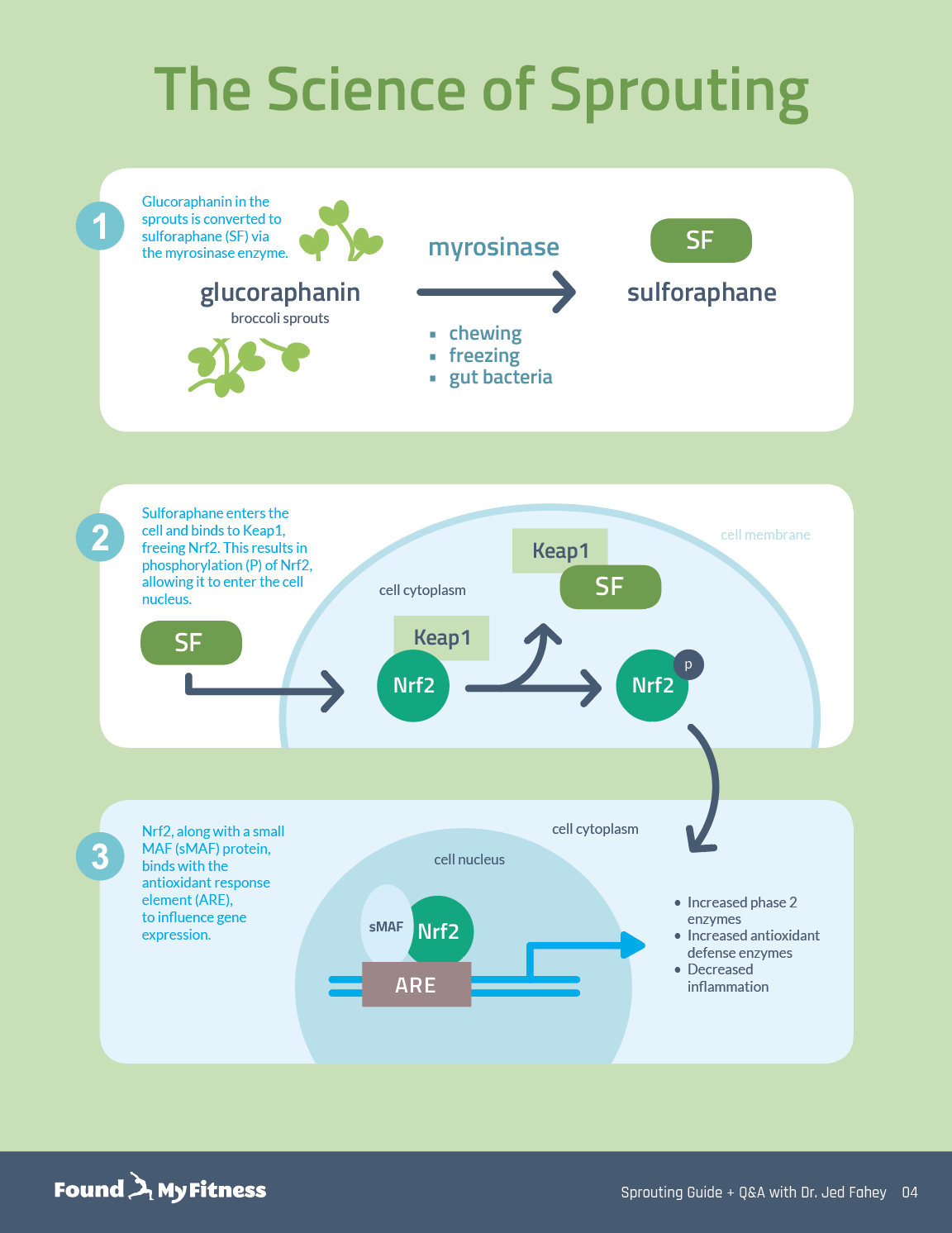Does moringa lower blood glucose levels? | Jed Fahey
Enter your email to get our 15-page guide to sprouting broccoli and learn about the science of chemoprotective compount sulforaphane.
Broccoli sprouts are concentrated sources of sulforaphane, a type of isothiocyanate. Damaging broccoli sprouts – when chewing, chopping, or freezing – triggers an enzymatic reaction in the tiny plants that produces sulforaphane.

Get the full length version of this episode as a podcast.
This episode will make a great companion for a long drive.
A growing body of scientific evidence suggests that moringa, a tropical plant that exerts a wide range of health benefits, improves glucose metabolism. Dr. Rhonda Patrick – who wears a continuous glucose monitor – has found that her post-smoothie blood glucose levels are markedly lower when her smoothie contains moringa powder. In this clip, Dr. Rhonda Patrick shares anecdotal evidence that moringa reduces blood glucose levels.
[Dr. Patrick]: Two comments, Jed. One just my own anecdote, I've been putting moringa powder from Kuli Kuli into my smoothies and I also feel great. But I also feel great without the moringa powder and the smoothie. So, but the interesting thing I have noticed with moringa powder, and this has been repeatable, I've been wearing a continuous glucose monitor for, oh, about three years now and the...
[Dr. Fahey]: Hardcore, hardcore.
[Dr. Patrick]: So hardcore, you have no idea. But my typical smoothie is some...a little bit of kale and blueberries, avocado, and collagen powder. And adding the moringa powder in there, the moringa powder... The blueberries, it doesn't really raise my glucose levels much. So the smoothie itself without the moringa powder, you know, brings me to about postprandial glucose, like, 105. And the moringa powder consistently lowers that by, I don't know, 7 to 10 units. Don't have any idea what's going on mechanistically, I'm sure someone is going to study it. And there's been some interesting research on type 2 diabetes. And I don't want to go there because we have to get to safety, which is a really important chunk of this Q&A. But I thought that was an interesting anecdote.
The second comment is there was a live question. Sorry. Go ahead.
[Dr. Fahey]: Absolutely. So you can't say something like that and not have me interrupt. Yeah. So the biggest medical indication for moringa leaf powder is going to be...is, I think, diabetes. And that has...that is under...
[Dr. Patrick]: You're kidding?
[Dr. Fahey]: No. No, no, I'm not. That is under active investigation. Blood glucose control.
[Dr. Patrick]: You're kidding?
[Dr. Fahey]: No. No, we have a review that shows...there are...there were six, not all good studies at all, and they were all tiny, showing an effect of moringa leaves or moringa leaf powder. We can talk about that another time. I've even talked about it on a podcast.
[Dr. Patrick]: So my N of 1 was, you know, actually probably real.
[Dr. Fahey]: Very interesting. Now if all 100 million of your viewers are wearing glucose monitors, we can put them together and have a study.
An essential mineral present in many foods. Iron participates in many physiological functions and is a critical component of hemoglobin. Iron deficiency can cause anemia, fatigue, shortness of breath, and heart arrhythmias.
A chemical that causes Parkinson's disease-like symptoms. MPTP undergoes enzymatic modification in the brain to form MPP+, a neurotoxic compound that interrupts the electron transport system of dopaminergic neurons. MPTP is chemically related to rotenone and paraquat, pesticides that can produce parkinsonian features in animals.
Relating to the period after eating. Postprandial biomarkers are indicators of metabolic function. For example, postprandial hyperglycemia is an early sign of abnormal glucose homeostasis associated with type 2 diabetes and is markedly high in people with poorly controlled diabetes.
An antibody that plays key roles in immunity. Secretory IgA is the most abundant antibody in the mucosal immune system, accounting for nearly 20 percent of serum immunoglobulin. It is crucial in protecting the intestinal epithelium from toxins and pathogenic microorganisms.
A metabolic disorder characterized by high blood sugar and insulin resistance. Type 2 diabetes is a progressive condition and is typically associated with overweight and low physical activity. Common symptoms include increased thirst, frequent urination, unexplained weight loss, increased hunger, fatigue, and impaired healing. Long-term complications from poorly controlled type 2 diabetes include heart disease, stroke, diabetic retinopathy (and subsequent blindness), kidney failure, and diminished peripheral blood flow which may lead to amputations.
Volatile organic compound. An organic chemical that has a high vapor pressure at ordinary room temperature.
Supporting our work
If you enjoy the fruits of
 , you can participate in helping us to keep improving it. Creating a premium subscription does just that! Plus, we throw in occasional member perks and, more importantly, churn out the best possible content without concerning ourselves with the wishes of any dark overlords.
, you can participate in helping us to keep improving it. Creating a premium subscription does just that! Plus, we throw in occasional member perks and, more importantly, churn out the best possible content without concerning ourselves with the wishes of any dark overlords.
Sulforaphane News
- Sulforaphane extends lifespan and healthspan in worms via insulin and insulin-like growth factor-1 signaling.
- Paul Saladino, MD explains how we may have overstated the health benefits of plants and especially sulforaphane
- NRF2 much of a good thing (December 2017)
- A pilot trial finds sulforaphane treatment increased glutathione levels in the blood & hippocampus region of the brain in healthy people.
- A new study found sulforaphane (found in broccoli sprouts) improved behavior & social responsiveness in children with autism.






































































